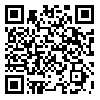Fri, Feb 20, 2026
[Archive]
Volume 38, Issue 1 (1-2024)
Med J Islam Repub Iran 2024 |
Back to browse issues page
Download citation:
BibTeX | RIS | EndNote | Medlars | ProCite | Reference Manager | RefWorks
Send citation to:



BibTeX | RIS | EndNote | Medlars | ProCite | Reference Manager | RefWorks
Send citation to:
Solhi M, Dehdari T, Emami Hamzehkolaee M, Shirafkan H, Hamidia A. Development and Validation of an Instrument for Assessing Nurses’ Control Sources of Resilience in the COVID-19 Pandemic. Med J Islam Repub Iran 2024; 38 (1) :138-145
URL: http://mjiri.iums.ac.ir/article-1-8386-en.html
URL: http://mjiri.iums.ac.ir/article-1-8386-en.html
Department of Education and Health Promotion, School of Public Health, Iran University of Medical Sciences, Tehran, Iran , Emami.mahasti@iums.ac.ir
Abstract: (1653 Views)
Background: Nurses' resilience in the care of patients with Coronavirus Disease 2019 (COVID-19) is essential. This study aimed to develop and validate an instrument for assessing nurses' resilience control resources in the COVID-19 pandemic.
Methods: In this qualitative study, with a conventional content analysis based on a literature review and semi-structured interviews conducted with 20 nurses, the initial draft of the instrument was prepared in different aspects based on a 5-point scale. The instrument's face validity and content validity were examined in 15 nurses and 15 experts, and construct validity was obtained in 482 nurses using the available sampling method. Data were analyzed in SPSS software Version 24 using indexes and analytic tests.
Results: Out of 54 items, 18 items were confirmed by the expert panel and the items had content validity ratio and content validity index scores higher than 0.79. According to the results of an exploratory factor analysis, this tool has 4 dimensions: God, chance, internal locus of control, and powerful others. They accounted for 48.06% of the total variance. CFA showed the indices confirmed the model fit (χ2/df = 1.846, comparative fit index = 0.921, incremental fit index = 0.923, root mean square approximation error = 059, goodness of fit index = 0.905). The reliability of the instrument was acceptable (Ω > 0.70, α > 0.7, CR >0.60, and intra-class correlation coefficients > 0.70).
Conclusion: The developed tool is used to measure the control resources of nurses' resilience in caring for COVID-19 patients. It can help recognize the focus areas for developing appropriate interventions.
Methods: In this qualitative study, with a conventional content analysis based on a literature review and semi-structured interviews conducted with 20 nurses, the initial draft of the instrument was prepared in different aspects based on a 5-point scale. The instrument's face validity and content validity were examined in 15 nurses and 15 experts, and construct validity was obtained in 482 nurses using the available sampling method. Data were analyzed in SPSS software Version 24 using indexes and analytic tests.
Results: Out of 54 items, 18 items were confirmed by the expert panel and the items had content validity ratio and content validity index scores higher than 0.79. According to the results of an exploratory factor analysis, this tool has 4 dimensions: God, chance, internal locus of control, and powerful others. They accounted for 48.06% of the total variance. CFA showed the indices confirmed the model fit (χ2/df = 1.846, comparative fit index = 0.921, incremental fit index = 0.923, root mean square approximation error = 059, goodness of fit index = 0.905). The reliability of the instrument was acceptable (Ω > 0.70, α > 0.7, CR >0.60, and intra-class correlation coefficients > 0.70).
Conclusion: The developed tool is used to measure the control resources of nurses' resilience in caring for COVID-19 patients. It can help recognize the focus areas for developing appropriate interventions.
Type of Study: Original Research |
Subject:
Health
Send email to the article author
| Rights and permissions | |
 |
This work is licensed under a Creative Commons Attribution-NonCommercial 4.0 International License. |








